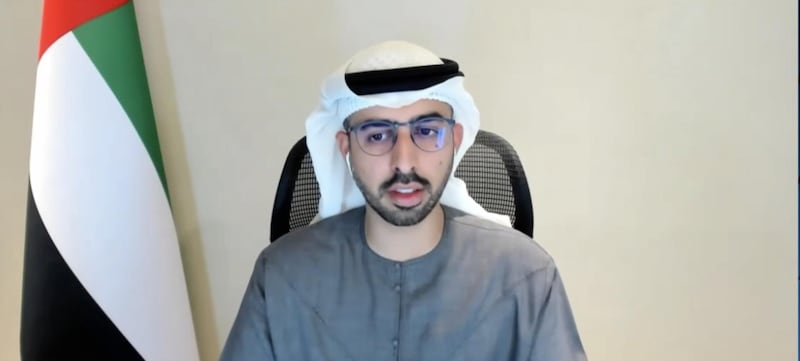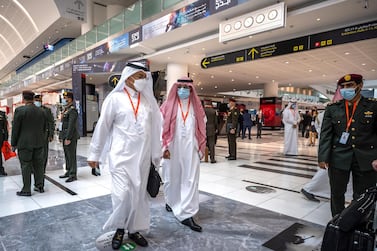Integrating artificial intelligence into defence systems presents a number of challenges but there is a pressing need to do so, a UAE minister told the International Defence Conference yesterday.
“Defence was [historically] focused on defending humans because humans were the source of productivity, the source of return economically”, said Omar Al Olama, the UAE’s Minister of State for AI, Digital Economy and Remote Work Applications.
Increasingly, “we are seeing machines take over large parts” of a nation’s economic output.
This means that “defending these systems is as critical as defending the sovereignty of the nation, or defending lives,” he said.
Military systems underpinned by AI such as missile defence, cyber security, drones and counter-unmanned aerial vehicles are expected to have the highest demand at this year’s event, which organisers expect to draw as much as $5 billion in new contracts.
Mr Al Olama said the main challenge in using AI was building local expertise.
“If the people that are deploying the system do not understand what the systems are capable of, you will always have black swan events that come up and actually [affect] people’s lives negatively,” he said.
“Trying to remove that layer of ignorance, trying to educate people, trying to create expertise within every vertical of government is extremely important and that is something that we have worked on for the past couple of years.”
Developing robust computing power and training algorithms on an adequate amount of diverse data to minimise poor decision making or bias is the second most important part of using the technology, he said.
The third challenge is the security of imported AI, which opens up the risk “of backdoor access”, he said.
Mr Olama said there was always a chance of "some people poisoning certain data sets" or compromising these systems, leading to detrimental effects on the receiving country.
Another concern throughout the development process is cost, said Mr Al Olama.
“If one explosive drone that comes to wreak havoc costs $1,000, and the systems that defend our cities and defend the livelihoods of people cost $200,000, then there is a disconnect here between the cost of the artillery and the cost of the defence,” he said.
Although it is critical to create systems that can thwart adversaries, this must be done at a cost that is competitive, he said, and one that does not far outpace the outlay of much cheaper weapons often being used by non-state actors.
Eric Papin, chief technical and innovation officer at France’s Naval Group, said there was no bad technology, only bad users. He echoed Mr Al Olama’s sentiment that AI is still in its earliest stages to be used on battlefields.
The company, one of Europe’s largest by revenue and a manufacturer of naval vessels and defence equipment, has had a presence in the UAE since 2010.
It follows the standard set by the French Navy that AI never takes a decision to launch a weapon, relying instead on what is known as "human in the loop".
"AI gives us the information that maybe there is a threat," Mr Papin told The National on the sidelines of the conference, but military personnel still must decide how best to respond.
AI is most relevant when it comes to predictive maintenance and extending the lifespan of a submarine or vessel, he said.
Through a recently opened office in Abu Dhabi, the Naval Group is working to provide the knowledge transfer Mr Al Olama was calling for.
The company has partnered with the Tawazun Economic Council to offer internships to Emiratis and to develop products for the UAE Navy. Products developed locally can also be directed towards export markets.
The company, which recently produced a one-tonne vessel propeller using additive 3D printing, is seeking opportunities to produce more in this emerging field.
A major risk of scaling up 3D printing too quickly is the proliferation of counterfeit replacement parts.
Simulation tools using AI could be of use here, said Mr Papin. Running scenarios to understand the threats created by new technology, particularly if they land in the hands of bad actors, could be valuable.
“We can simulate what could be the result of combat between our systems and adversaries,” he said.
However, he emphasised that “man is always in the loop of the decision ... especially when it comes to the decision to use a weapon”.







